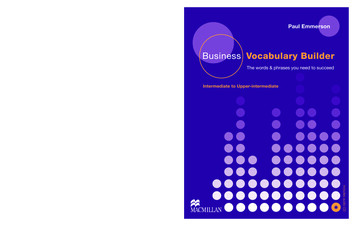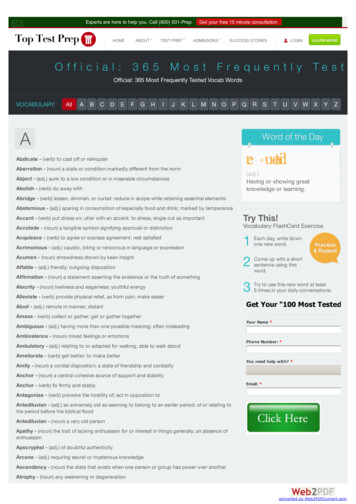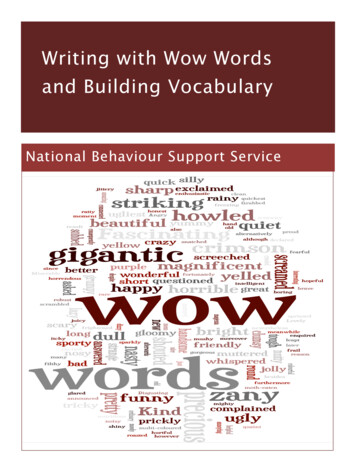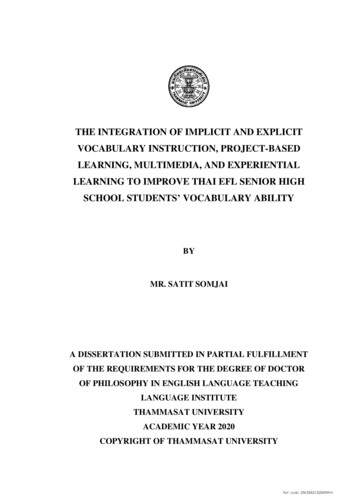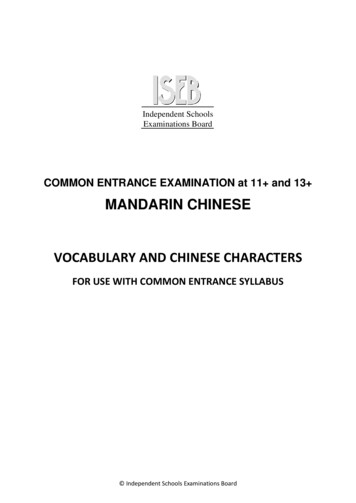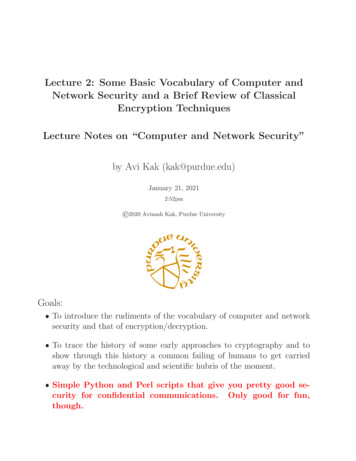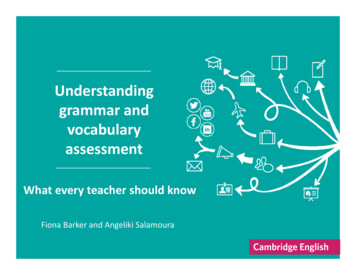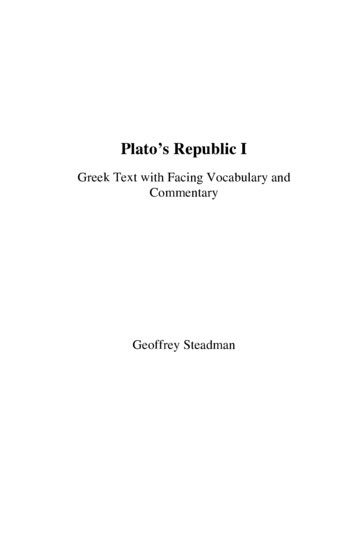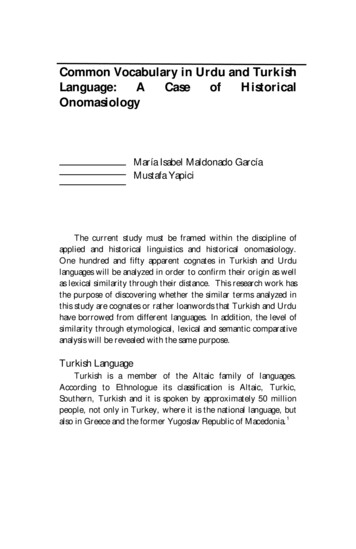
Transcription
WHelpsheetGiblin Eunson LibraryUSING VOCABULARY IN BUSINESSAND ECONOMICSUse this sheet to help you: Expand vocabulary relevant for your studies in Business and Economics Develop strategies for the continued development of your academicvocabulary5 minute self testBefore you read the Helpsheet, spend five minutes considering the followingquestions: How confident am I concerning the vocabulary I need for my studies in businessand economics? How important is it for me to expand my vocabulary for academic andprofessional contexts? What are some specific strategies that will help me develop my vocabulary?Authors: Eggins, M., Beaumont, T.library.unimelb.edu.au/libraries/bee
USING VOCABULARYWUsing vocabulary in Business and EconomicsAs a Business and Economics student, it is important you see yourself as a developingprofessional in your particular discipline. In order to be such a professional, you needto sound and act like one – a practitioner who can express themselves articulately topeers. Indeed, individual consultations have highlighted that students need to be moreprecise and accurate in their communication. For example, this means typically avoidingterms like “some”, “recently” and “in the last few years” and instead giving more exactinformation to help support your ideas.Such clear and appropriate vocabulary used in your ‘practice’ now (be it your essays,reports, oral presentations and tutorials) and later in the workplace is vital in ensuringyour ideas can be understood.Finding the vocabulary you needDon’t just rely on what you already know for the vocabulary you use. Instead, whengiven an assessment task, for example, carefully consider the discipline-specificvocabulary supplied in the question and assessment criteria. Use any of these terms thatmight be relevant – if you are not sure of their meanings, ask your tutor or consult adictionary. Other good vocabulary sources include course and subject outlines (includinglearning outcomes), set readings, textbooks (especially glossaries) and relevant websites,journals or other sources included on subject LMS pages.Some specific business and economics vocabularyThe lists below are a good general starting point for building your business andeconomics vocabulary.Nouns:Nouns sionmanufacturingreporttargetPage 1library.unimelb.edu.au/libraries/bee
USING VOCABULARYWNouns (related to ciatecreditorlabor forceretailerboard memberdirectormanagershareholderboard of yerpresidentstaffchief xecutiveproprietorwholesalerN.B. note that capital letters are used when you are referring to a specific position (‘MrJohn Smith, Chief Executive Officer of X’) but if the use is more general, capitalisation isnot required (‘many company directors are in favor of this change’).Nouns (related to money)Generally more neutral transactionfloatofferrefundvaluationOften used in a positive tturnovercapitalequityrevenueyieldOften used in a negative ns (related to places or inationalpoint of salecompanyfirmnetworkshop frontPage 2library.unimelb.edu.au/libraries/bee
USING VOCABULARYWVerbs:Rather than using very general verbs such as ‘be’, ‘do’ or ‘have’ try to use more preciseverbs where possible – this will make your writing more specific, dynamic andcredible. For further illustration look at the two examples below.Original: Managers should have good communication skills.Revised version with more specific verb: Managers should communicate effectively.Original: The Account Manager said the payment was fine.Revised version with more specific verb: The Account Manager authorised thepayment.Here is a list of some more particular omotesupplydeliverimprovepurchasetargetAdjectives and adverbs:Adjectives and adverbs can also help in giving more detail and thus give your readersand listeners a clearer picture. Be especially careful to qualify relatively neutral wordslike ‘effect’.If you say for example “X had an effect on Y” that is not very useful. It is far better togive an indication of the size of the effect (“X had a significant effect on Y due to ” or “Xsignificantly affected Y due to ”) and/or the nature of it (“X had a very beneficial effecton Y because of ”) along with supporting evidence. Here are some more examples:Adjective (opinion) adjective (fact) tivemarketingstrategies Verb adverb (opinion)noun(specific) VerbadverbThe Presidentleadinclusively.Page 3library.unimelb.edu.au/libraries/bee
USING VOCABULARYWAdverb (opinion) adjective (opinion)noun‘be’ al The list below has some useful adjectives. Note that many of these can also becommonly used as adverbs or turned into adverbs Word familiesUsing different word forms of a particular ‘root’ word can also give your expressionmore variety:NounVerbAdjectiveAdverbproduct, production ncompete ( preposition)competitivecompetitivelyprofitprofit ( preposition)profitableprofitablyIf you are not sure of the spelling for a particular word form, consult a dictionary likeCambridge Advanced Learner’s Dictionary which details various derivatives of a wordunder the ‘Browse List’ heading.CollocationsDeveloping a good vocabulary is not just about learning words in isolation. Rather,think about groups of words that often go together in print and/or speech. Thesecombinations, known as collocations, are well known and often used by nativespeakers. In contrast, other combinations may sound unnatural. Some examplesbelow illustrate this:Natural expressionUnnatural expressionhuman resourcespeople resourcescustomer or client servicebuyer servicesales teamsales squadPage 4library.unimelb.edu.au/libraries/bee
USING VOCABULARYWCollocations can help your language sound more natural and understandable while alsogiving you alternative ways to express concepts. They can have a number of differentgrammatical structures.Compound nounsOne of the most common collocations is the compound noun (adjective and nounor noun and noun) where single words join others to make a more specific meaning.Sometimes these may be combined to make just one word as in ‘trademark’ or ‘output’while in other cases they may be two (or even more) as in ‘stock market’ or ‘closeeconomic ties’. In addition, a word like ‘buyback’ is usually collocated with ‘share’ (‘sharebuyback’). Once it is clear, you can just use the ‘key’ word rather than the one thatmodifies it as in:The brand loyalty of consumers to product X is strong. This loyalty has been reflected inlast month’s strong sales figures.Below is a table of some examples of common compound nouns in business:brand loyaltyfixed assetsnet profitcash flowfocus groupniche marketingclose economic tiesjoint ventureraw materialscorporate governancelisted companyshare tradingdistribution channelmarket positionsupply chainOther kinds of collocationsCollocations can also be formed in other combinations including: Adverb adjective:The new sales strategy represents a clear attempt to remain internationally competitivein the marketplace. Noun verb adverb:Markets reacted strongly to the profit forecast. Verb noun:The subsidiary generated substantial profits from its mining exploration lease. Phrasal verb (verb preposition):The company was negotiating with a supplier. More complex noun group (includes a noun with a preposition)Improvements in productivity have lifted the company’s bottom line.Page 5library.unimelb.edu.au/libraries/bee
USING VOCABULARYWLearning more collocationsTo help learn collocations try to recognise them when you hear (and particularly read)them. When you learn a new word too, write down some collocations for it (i.e. if theword is ‘brand’ you could also note ‘brand identification’ and ‘brand loyalty’). Apart fromnoting the word collocations in its particular entry, you could organise them by action,grammatical structure or discipline as in the examples below:Organising your collocationsBy grammatical structureAction (verb various nouns)negotiatean agreementnegotiatewith staffbreak intothe marketdominatethe marketmarketresearchmarketsharebank accountbank balancebank branchbank depositbank loancentral bankAction (various verbs noun):Structure (adjective noun):By discipline (e.g. banking)Other tips include: read as much as possible to understand collocations in context and then use thesenew collocations if possible in both your written and spoken communication Using print and on-line resources such as: a learner’s dictionary (i.e. Cambridge Advanced Learner’s Dictionary or OxfordAdvanced Learner’s Dictionary) to look at example sentences on-line concordances which are huge collections of documents that can showhow a word is used in real texts. Thus, if you are unsure what preposition to use(after a verb for example) you can type in the verb and see what prepositionsappear with it in the sentences provided in such online references such as CorpusEye and Lex TutorSynonymsAnother way to add variety in your writing is to use pronouns such as ‘it’, ‘they’, ‘this’and ‘these’. Ensure however there is no confusion about what you are referring to. Forexample, the original sentence is somewhat ambiguous in its use of pronouns:Original: The management negotiated directly with staff as a group. They found thatit was a difficult process and it took six months to complete. After it was complete, itwas found that productivity went up and less staff left the company. It shows that suchthings are possible and it can work well.A revised version however includes less repetition and ambiguity, with more specificterms including the use of words that are similar in meaning to the word/s already used(synonyms):Page 6library.unimelb.edu.au/libraries/bee
USING VOCABULARYWRevised version: The management negotiated directly with staff as a group. Thesedealings with employees were difficult and took six months. The result however wasincreased productivity and lower staff turnover. Such positive benefits show thatmanagement-staff bargaining can be highly advantageous to both parties.If you right click in Microsoft Word a list of synonyms is provided functioning as a basicthesaurus. A sample of some relevant synonyms is below. Make sure though that the oneyou use corresponds to the exact meaning of the word you are ating risticfixed/setunified/integratedNote too that some words may sound similar or indeed have similar meanings however,it is important you choose exactly the right word for your purpose. That is, ask yourselfare you talking about a ‘recession’ or a ‘depression’, the ‘internet’ or ‘intranet’ or a‘monopoly’, or ‘duopoly’? If in any doubt, consult a dictionary!AntonymsWhen you are dealing with terms that have a specific opposite (antonym) be carefulbecause if you choose the wrong option the logic (coherence) of your work will suffer.In fact , often the opposite looks and/or sounds somewhat similar to the original word sobe careful with proofreading!Some common opposites for business contexts age 7library.unimelb.edu.au/libraries/bee
USING atisfy/breachAcronymsIn business and economics, like all fields, initials are often used to represent concepts.Some examples are below. If you do use these, generally you need to ensure that youspell them out first, followed by the acronym in brackets. Thereafter, just include theinitials but ensure you do not over do it otherwise your writing may becoming overlyrepetitive and dull to read.Return on investment (ROI)Annual general meeting (AGM)Gross domestic product (GDP)Price to earnings ratio (P/E)Profit & loss statement (P&L)Key performance indicators (KPIs)Place ideas in a larger contextAnother important consideration in vocabulary is con
USING VOCABULARY IN BUSINESS AND ECONOMICS 5 minute self test Before you read the Helpsheet, spend five minutes considering the following questions: How confident am I concerning the vocabulary I need for my studies in business and economics? How important is it for me to expand my vocabulary for academic and professional contexts? What are some specific strategies that will help m
